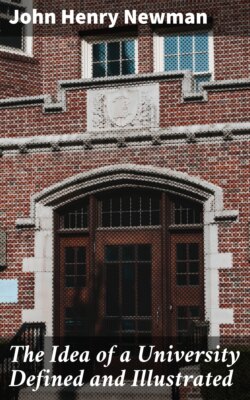Читать книгу The Idea of a University Defined and Illustrated - John Henry Newman - Страница 47
На сайте Литреса книга снята с продажи.
12.
ОглавлениеTable of Contents
“My answer,” he says, “is, first, that the pursuit of wealth, that is, the endeavour to accumulate the means of future subsistence and enjoyment, is, to the mass of mankind, the great source of moral improvement.” Now observe, Gentlemen, how exactly this bears out what I have been saying. It is just so far true, as to be able to instil what is false, far as the author was from any such design. I grant, then, that, ordinarily, beggary is not the means of moral improvement; and that the orderly habits which attend upon the hot pursuit of gain, not only may effect an external decency, but may at least shelter the soul from the temptations of vice. Moreover, these habits of good order guarantee regularity in a family or household, and thus are accidentally the means of good; moreover, [pg 092] they lead to the education of its younger branches, and they thus accidentally provide the rising generation with a virtue or a truth which the present has not: but without going into these considerations, further than to allow them generally, and under circumstances, let us rather contemplate what the author's direct assertion is. He says, “the endeavour to accumulate,” the words should be weighed, and for what? “for enjoyment;”—“to accumulate the means of future subsistence and enjoyment, is, to the mass of mankind, the great source,” not merely a source, but the great source, and of what? of social and political progress?—such an answer would have been more within the limits of his art,—no, but of something individual and personal, “of moral improvement.” The soul, in the case of “the mass of mankind,” improves in moral excellence from this more than any thing else, viz., from heaping up the means of enjoying this world in time to come! I really should on every account be sorry, Gentlemen, to exaggerate, but indeed one is taken by surprise, one is startled, on meeting with so very categorical a contradiction of our Lord, St. Paul, St. Chrysostom, St. Leo, and all Saints.
“No institution,” he continues, “could be more beneficial to the morals of the lower orders, that is, to at least nine-tenths of the whole body of any people, than one which should increase their power and their wish to accumulate; none more mischievous than one which should diminish their motives and means to save.” No institution more beneficial than one which should increase the wish to accumulate! then Christianity is not one of such beneficial institutions, for it expressly says, “Lay not up to yourselves treasures on earth … for where thy treasure is, there is thy heart also;”—no institution more mischievous than one which should diminish the [pg 093] motives to save! then Christianity is one of such mischiefs, for the inspired text proceeds, “Lay up to yourselves treasures in heaven, where neither the rust nor the moth doth consume, and where thieves do not dig through, nor steal.”
But it is not enough that morals and happiness are made to depend on gain and accumulation; the practice of Religion is ascribed to these causes also, and in the following way. Wealth depends upon the pursuit of wealth; education depends upon wealth; knowledge depends on education; and Religion depends on knowledge; therefore Religion depends on the pursuit of wealth. He says, after speaking of a poor and savage people, “Such a population must be grossly ignorant. The desire of knowledge is one of the last results of refinement; it requires in general to have been implanted in the mind during childhood; and it is absurd to suppose that persons thus situated would have the power or the will to devote much to the education of their children. A further consequence is the absence of all real religion; for the religion of the grossly ignorant, if they have any, scarcely ever amounts to more than a debasing superstition.”11 The pursuit of gain then is the basis of virtue, religion, happiness; though it is all the while, as a Christian knows, the “root of all evils,” and the “poor on the contrary are blessed, for theirs is the kingdom of God.”
As to the argument contained in the logical Sorites which I have been drawing out, I anticipated just now what I should say to it in reply. I repeat, doubtless “beggary,” as the wise man says, is not desirable; doubtless, if men will not work, they should not eat; there is doubtless a sense in which it may be said that mere [pg 094] social or political virtue tends to moral and religious excellence; but the sense needs to be defined and the statement to be kept within bounds. This is the very point on which I am all along insisting. I am not denying, I am granting, I am assuming, that there is reason and truth in the “leading ideas,” as they are called, and “large views” of scientific men; I only say that, though they speak truth, they do not speak the whole truth; that they speak a narrow truth, and think it a broad truth; that their deductions must be compared with other truths, which are acknowledged to be truths, in order to verify, complete, and correct them. They say what is true, exceptis excipiendis; what is true, but requires guarding; true, but must not be ridden too hard, or made what is called a hobby; true, but not the measure of all things; true, but if thus inordinately, extravagantly, ruinously carried out, in spite of other sciences, in spite of Theology, sure to become but a great bubble, and to burst.
